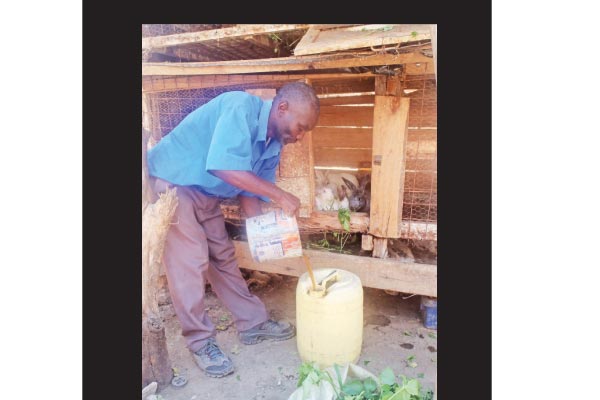Peter Maina pours a brown liquid into a 20 litre container slowly to avoid spilling it.
It takes him about five minutes to fill the container with the liquid that looks like dirty water.
“Now I have 200 litres, I have five more 20 litre containers to fill,” says Maina with a sigh of relief.
Maina is a rabbit farmer in Kariobangi, Nairobi. However, he does not keep the rabbits for sale but he harvests their urine.
He went into rabbit farming so that he can sell them as they fetch good money.
But mid into the venture, he discovered that he can make more money from selling rabbit urine, which is used to make organic fertiliser.
The farmer owns over 60 rabbits comprising of California White and New Zealand breeds.
“Managing the rabbits is not labour intensive due to their calm nature and they rarely fall sick. I intend to have 100 rabbits so that I can boost my production. I will also sell the rabbits,” says the father of five, who invested Sh10,000 into the business, in January.
He has constructed the rabbit pen such that urine sips through the wire mesh, into the corrugated plastic sheet, to the gutters and finally into buckets.
Rabbit urine is highly corrosive, thus one must use materials that do not rust when constructing the pens.
In a month, he collects up to 300 litres of urine, which he carries on his pick-up truck to a depot on Ladhies Road for transportation to Eldoret, where the factory that processes the urine is located.
“I have delivered about 2,000 litres of urine to the processing plant and I am now waiting for my pay cheque,” says Maina, who bought the animals from Kinangop, Kiria-ini and Nanyuki.
The urine the farmer produces is used in the making of Rabbits Urine Extra, an organic liquid manure, which was unveiled recently.
The manure is manufactured from urine produced by farmers in Bomet, Eldoret, Nairobi and Kisii counties.
“Plans are underway to open two such factories at Dagoretti and Ruai in Nairobi in the course of this year,” says Robinson Runyenje, the developer of the fertiliser.
The fertiliser is produced by Kenya Com Rabbit Consortium Limited.
Runyenje, the chief executive at the consortium, says he conducted research and realised the organic fertiliser in the market was not made from rabbit urine.
“The fertiliser is rich in various elements including macro and micro nutrients that can be used as foliar feed and soil conditioner,” he says.
According to him, rabbit urine can end farmers’ reliance on NPK and CAN fertilisers whose prolonged use leave the soil unhealthy.
“As it is, our soils are facing an acidity crisis. Farmers are using a lot of money to reclaim their soils and make them useful,” says Runyenje.
To supply the company with rabbit urine, farmers have to register to be members.
“They are paid Sh100 per litre of urine supplied, alongside a bonus that will be given quarterly,” he says.
The idea is getting the farmer to sell directly without going through middlemen, thus enabling the farmer to earn more.
“Value addition is key to reaping better returns since it allows farmers to be in control of the price the product retails at,” says Runyenje.
He notes that by selling their urine, rabbit farmers reap twice.
“In a few weeks, the fertiliser will be available in agrovet shops and supermarkets in packages of 500ml, one, five and 20 litres,” says Runyenje, who got clearance from the government to sell the product.
To use the fertiliser, one mixes it with water in the ratio of 200ml of manure to 20 litres of water. This can spray an acre of land. The mixture is put in a pump and sprayed on the crops.
The spray should be done early in the morning and late in the evening as this is when the stomata are open. The leaves take in the manure directly while the rest is absorbed by the soil.
“Since it is a foliar feed, the spraying should be done at different stages of growth. For instance, in fruits, it should be done at sprouting, colouring and flowering stages,” says Runyenje.
With time, there will be no need to use fertiliser as the soil will be rich in essential nutrients absorbed from the rabbit urine.
It is advisable that the mixture is used the same day it is made since it has some potent elements that could be harmful. The beauty of it is that rabbit urine has no expiry date as long as it is kept covered after harvesting to preserve ammonia. Runyenje opted for rabbit urine rather than goat or cow due to the ease of harvesting.








